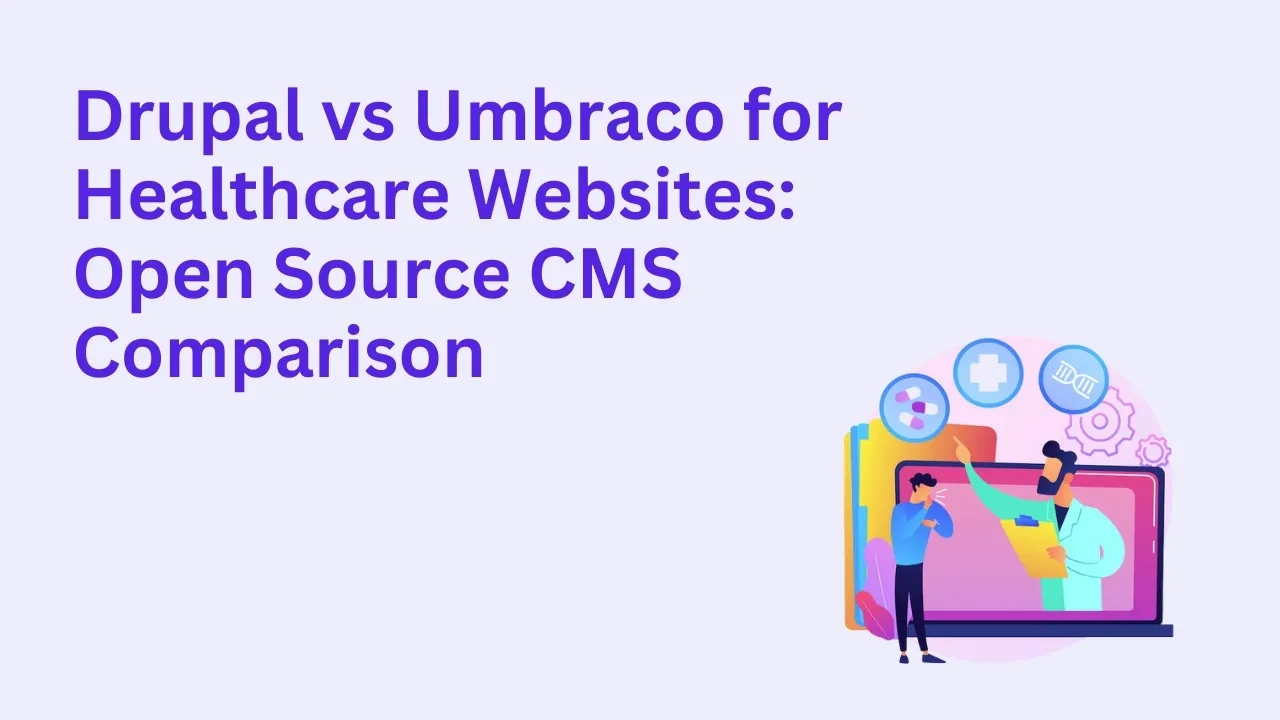Drupal vs Umbraco for Healthcare Websites: Open Source CMS Comparison

Healthcare organizations face unique challenges when building digital platforms—security, scalability, regulatory compliance, and accessibility are non-negotiable. Choosing the right CMS is critical to meeting these demands.
Drupal and Umbraco are two powerful open-source content management systems, each with its own strengths. But which is better for healthcare websites?
In this blog, we’ll compare Drupal vs Umbraco across key criteria that matter most in healthcare: HIPAA compliance, flexibility, multilingual support, integrations, and security.
Understanding the Platforms
What Is Drupal?
Drupal is a PHP-based enterprise-grade CMS known for its flexibility, modular architecture, and strong support for custom workflows, access control, and content modeling. It’s used by hospitals, government agencies, and Fortune 500 companies.
What Is Umbraco?
Umbraco is a .NET-based open-source CMS that emphasizes ease of use and speed of development. It’s popular in mid-sized organizations, especially those already using Microsoft technologies.
Key Comparison: Drupal vs Umbraco for Healthcare
1. Security & Compliance
Drupal has a dedicated security team and a proven track record in government and healthcare sectors. Its modular structure allows for HIPAA-compliant configurations and strict access control.
Umbraco also supports secure development, but being .NET-based, it often relies on external configurations and third-party modules to meet compliance standards.
Verdict: Drupal is more mature in security documentation and real-world healthcare implementations.
2. Custom Workflows & Access Controls
Drupal excels at custom user roles, editorial workflows, and granular permissions—ideal for large healthcare teams with complex content governance.
Umbraco provides basic role management but may need custom development for advanced workflow scenarios.
Verdict: Drupal is better suited for complex editorial and compliance workflows.
3. Multilingual Support
Drupal offers native multilingual capabilities, supporting translation for content, configuration, and UI out of the box.
Umbraco supports multilingual sites through plugins or custom setups, but it’s less seamless than Drupal’s built-in features.
Verdict: Drupal is the more robust choice for multilingual healthcare providers.
4. Integrations
Drupal integrates smoothly with CRMs, EHR systems, marketing tools, and patient portals. Its API-first architecture allows for custom integrations with healthcare software.
Umbraco can integrate with Microsoft-based ecosystems, making it a good fit for organizations using Azure, Dynamics, or SharePoint.
Verdict: Choose Drupal for broader interoperability; Umbraco for tight Microsoft integrations.
5. Accessibility & UX
Both platforms can deliver accessible websites, but Drupal has a strong community focus on WCAG and ADA compliance, with baked-in tools for accessibility auditing and theming.
Umbraco supports accessibility standards, though implementation depends more on developers.
Verdict: Drupal offers better built-in support and community guidance on accessibility.
When to Choose Drupal for Healthcare
Drupal is the best choice if:
You need HIPAA-compliant architecture
You require granular user permissions and workflows
You operate in multiple regions or languages
You need extensive third-party integrations
You are building a complex portal or content-heavy site
When to Choose Umbraco for Healthcare
Umbraco might be suitable if:
Your organization is built on the Microsoft stack
You prefer a .NET development environment
Your content and workflow needs are relatively simple
You’re looking for a lightweight CMS for fast deployment
Final Thoughts
Both Drupal and Umbraco are capable CMS platforms, but for healthcare-specific use cases, Drupal often has the edge due to its mature security practices, modular flexibility, accessibility readiness, and proven scalability.
At Drupalify, we specialize in developing secure, compliant Drupal websites for the healthcare industry. Whether you're a hospital, clinic, or healthcare SaaS provider, our team can help you build a digital platform that’s future-ready and fully aligned with industry regulations.
👉 Hire Expert Drupal Developers for your healthcare project
📅 Book a Free Consultation to discuss your CMS needs








